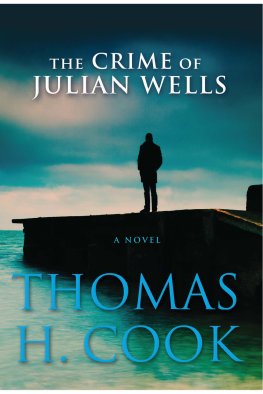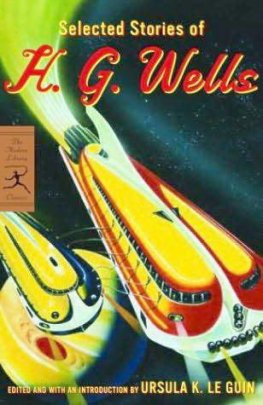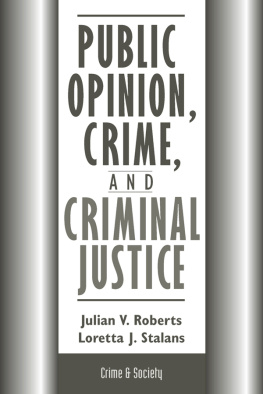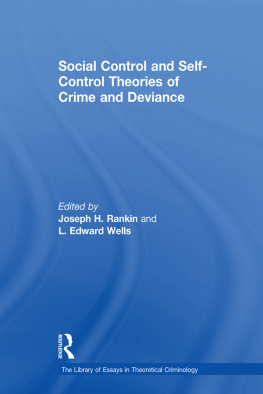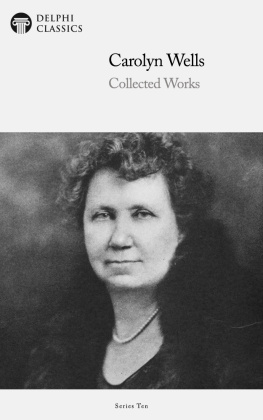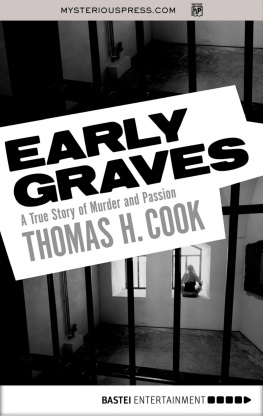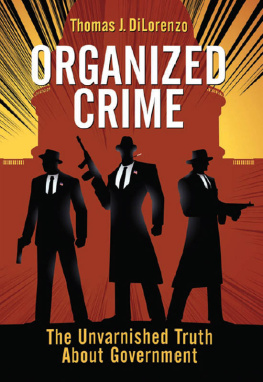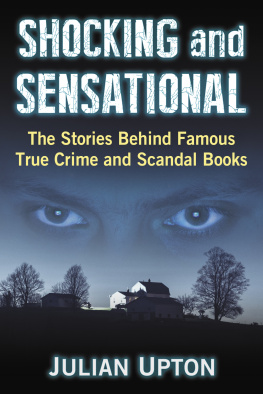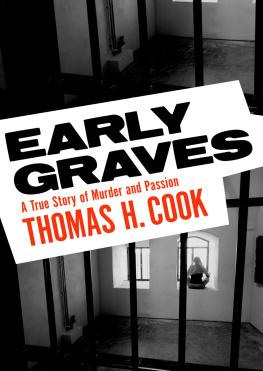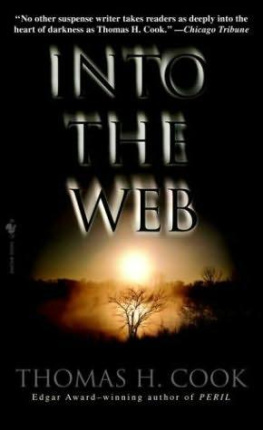Thomas Cook - The Crime of Julian Wells
Here you can read online Thomas Cook - The Crime of Julian Wells full text of the book (entire story) in english for free. Download pdf and epub, get meaning, cover and reviews about this ebook. year: 2012, publisher: Grove Press, genre: Detective and thriller. Description of the work, (preface) as well as reviews are available. Best literature library LitArk.com created for fans of good reading and offers a wide selection of genres:
Romance novel
Science fiction
Adventure
Detective
Science
History
Home and family
Prose
Art
Politics
Computer
Non-fiction
Religion
Business
Children
Humor
Choose a favorite category and find really read worthwhile books. Enjoy immersion in the world of imagination, feel the emotions of the characters or learn something new for yourself, make an fascinating discovery.
- Book:The Crime of Julian Wells
- Author:
- Publisher:Grove Press
- Genre:
- Year:2012
- ISBN:9780802194589
- Rating:5 / 5
- Favourites:Add to favourites
- Your mark:
- 100
- 1
- 2
- 3
- 4
- 5
The Crime of Julian Wells: summary, description and annotation
We offer to read an annotation, description, summary or preface (depends on what the author of the book "The Crime of Julian Wells" wrote himself). If you haven't found the necessary information about the book — write in the comments, we will try to find it.
The Crime of Julian Wells — read online for free the complete book (whole text) full work
Below is the text of the book, divided by pages. System saving the place of the last page read, allows you to conveniently read the book "The Crime of Julian Wells" online for free, without having to search again every time where you left off. Put a bookmark, and you can go to the page where you finished reading at any time.
Font size:
Interval:
Bookmark:
Thomas H. Cook
The Crime of Julian Wells
The Curfew tolls the Knell of parting Day,
The lowing Herd winds slowly oer the Lea,
The Plow-man homeward plods his weary Way,
And leaves the World to Darkness, and to me.
Thomas Gray, Elegy Written in a Country Church-YardBefore
He folds the map and puts it on the table beside his chair. Beyond the window, he sees the flat gray waters of the pond. The boat, its yellow paint long faded, rests beneath a weeping birch.
He rises, walks to the window, and looks out.
In the distance, a small breeze rustles the leaves of the birch and skirts along the green lawn and gently rocks the purple irises that grow beside the water. He has seen so many grasses, so many flowers. The lavender fields of France, the cloudberries of the Urals with their little orange petals, the feather grasses of the pampas swaying like dancers.
He will miss these things.
He considers the act, then its consequences.
He will make it clean.
There will be no fuss.
He turns and gives a final glance at the map. He has studied so many maps. He thinks of the water bearers of the world, almost always women, hauling their jerry jars to the river or the lake. His mind is like those jars, worn and dusty, scarred by use, but still able to hold its heavy store of memory.
And yet there is something he forgot.
He walks to the small desk in the corner, opens the notebook, and tears out the top sheet. He folds it carefully, without hurry, then sinks it deep into his pocket.
It is disturbance you must look for, the old trackers told him. Not prints. Not trails. But disturbance in the spear grass, a sense of reeds askew. Those will lead you to the one you seek.
He looks about the room for any hint of such disturbance, finds none, and with that assurance, walks to the door, then passes through it, and moves out onto the lawn. He feels the breeze whose movement he had sensed before, cool upon his face, a pressure on his shirt, a gentle movement in his hair.
He hears a bird call, glances up, and sees a gull as it crosses the lower sky. When was it he first saw the sunbirds of the Sudan, their sun-streaked, iridescent feathers?
He shakes his head. It doesnt matter now.
He draws down his gaze and with a steady stride makes his way to the boat. It is heavy, and he has been weakened, though less by his final work than by this final decision.
But the decision has been made.
The boat is weighty but he pulls it into the water. What was the lightest he ever knew? Oh yes, it was made of bulrushes. And what was the other word for bulrushes? Oh yes, it was tule.
The boat rocks violently as he climbs in, but he rights himself, grabs an oar, and pushes out into the water.
How far to go?
The center of the pond. Far enough that he will appear small and indistinct in the distance so that his sister cannot tell what he is doing, nor get to him before he can complete the task.
Seventy feet from shore now. Perhaps eighty. He has not rowed in a long time. Even now his arms are aching. But that will be over soon. He knows that he has grown weak in the Russian wastes, but he is surprised by just how weak he is. Or has his secret always worked upon him like a withering disease?
One hundred feet out from shore.
Enough.
He takes the folded paper from his pocket and sinks it into the water.
Done.
He sits quietly for a moment, then with his old resolve, he begins the process. First he rolls up his sleeves. For a few seconds he pumps his fist, squeezing in and out. The blue veins rise as if to his command.
He leans forward and picks up the knife. Its serrated edge will hurt, but he has all his life known pain.
No mess.
No fuss.
He holds one arm over the pale yellow port side and with a single slice opens up his vein. The blood flows down his hand and along his fingers in a steady stream that reddens the water below them. He brings the other arm and hangs it over the water, takes the knife with his bloodied hand and makes a second motion.
It is done.
At least the first phase.
Now there is only the will to wait.
He releases the knife and watches it splash into the red water.
The wait is not long.
Soon he begins to lean forward as life flows out of him. He will think no more of sunbirds and bulrushes.
Finally, he droops over the port side, his arms now deep in the water.
Seconds later he is gone.
The wait was not long, but its solitariness is unimaginable.
Oh, if I had but been there, my dear friend.
Oh, if I had but been there in the boat with you.
Knowing what I know now.
Part I
1
There is no more haunting story than that of an unsolved crime, Julian had once written, but solutions, I was to discover, can be haunting, too.
To know the world, one must travel it in the third-class carriage, and I had little doubt that that was surely how Julian had come to know it. He was one of those for whom the usual comforts meant nothing. If the water was yellow, the walls laced with mold, if the sink was ringed in rust, or even if there was no sink at all, if the mosquito net was ripped and the cloaca full, it was the same to Julian. The deeds that drew him were the darkest that we know, and hed pursued them with the urgency of a lover.
From his first trip abroad, Id had little doubt that he would remain an expatriate all his life, which made it all the stranger that, in the end-that terrible, lonely end-he had died at home.
Now my thought, growing more insistent by the hour, was how I might have saved him.
He was wizened, his sister, Loretta, said to me. If you can say that about a man who was only in his fifties. She took a sip from her drink. Its hard to imagine that hes gone.
We sat at a small square table in a quiet corner of what was still called an actors bar, though now it catered mostly to Broadway tourists. I presumed that Loretta had chosen it because it returned her to the days when shed struggled to be an actress, trudged that dreary path from audition to audition until rejections blade had whittled away the last of that youthful hope. Id seen her in two productions, both pretty far off Broadway. In the first, shed played the object of desire in A View from the Bridge. In the second, the title role in Hedda Gabler. In both cases her talent had impressed me, especially the uneasy balance of pathos and simmering violence shed brought to Hedda, which had also frightened me a little. Shed had every right to succeed on the stage, but hadnt. Watching her now, I decided that there was perhaps no ash quite so cold as the one left by an unrealized ambition, particularly an artistic one. But then, I thought, there is no such thing as a truly fulfilled ambition, is there? At twenty-three, Alexander the Great had bemoaned the fact that there were no more worlds for him to conquer. It seemed to me that we were all like poor thwarted Alexander, unsatisfied in one way or another. Some were dissatisfied with their choice of careers, others with their choice of mates, still others with their lack of money. My chief dissatisfactions were childlessness and widowhood, to which had now been added my failure to save my one true friend.
Some people, when they die, bring more than themselves to an end, Loretta said. The books I copyedit now are mostly happy talk. Tips on how to avoid thinking about the only things Julian ever thought about. She shook her head. Half the time, I feel like a whore. Her smile carried the dogged effort of a lost cause. Have you seen the new rewrite of
Font size:
Interval:
Bookmark:
Similar books «The Crime of Julian Wells»
Look at similar books to The Crime of Julian Wells. We have selected literature similar in name and meaning in the hope of providing readers with more options to find new, interesting, not yet read works.
Discussion, reviews of the book The Crime of Julian Wells and just readers' own opinions. Leave your comments, write what you think about the work, its meaning or the main characters. Specify what exactly you liked and what you didn't like, and why you think so.

